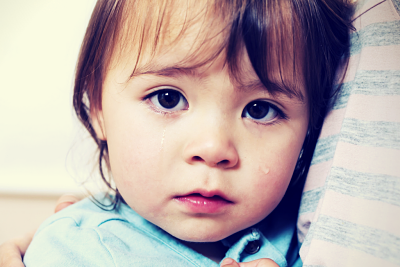Supporting Your Child Through Separation Anxiety

Just when parents feel they’ve finally cracked the code of how to get stuff done with baby in tow, another goalpost-shifter comes along in the form of Separation Anxiety. You’d just realised that baby is happy for 5 minutes in their highchair whilst you zipped upstairs to put the laundry mountain away, when now you’re faced with a red-faced, screaming, heart-string-tugger who isn’t going to let you out of their sight without tears. The ball and chain of parenthood can feel immensely overwhelming when separation anxiety strikes. So how do you overcome separation anxiety in young children?

Understanding the problem: Separation Anxiety explained
It’s usually pretty clear when a little one has separation anxiety, although there are a number of symptoms . Typically it peaks around baby’s first birthday, often making the party itself an exercise in juggling. However, it can start around 8 months or earlier, and tends to last throughout the toddler period.
However, don’t be fooled in to thinking this is the only time the Separation Anxiety Beast raises its head. It’s not unusual to have periods of Separation Anxiety when starting new childcare, or school, or even in older children particularly prone to worrying or who have SEN that add an extra layer of challenge.
Separation Anxiety in young children comes about due to their developmental progression and their understanding of object permanence. As babies gradually start to realise they are an independent being from their primary caregiver, but wholly dependent on that person for their very survival and well-being, it can be a mighty scary concept for them when that person is out of sight. They don’t know and understand that you can put the laundry mountain away in 5 minutes and be back being Entertainer-in-Chief in a flash. They therefore need to do everything in their power - with the only communication method available to them (crying) - to let you know they aren’t happy about your absence.

How to Overcome Separation Anxiety
Understanding separation anxiety is one thing, but how do you overcome this incredibly challenging period of parenting? How do you get things done when your little one won’t let you out of their sight? Let alone, how do you return to work? The reality is that separation anxiety often does peak around the time that maternity leave is coming to an end, and this makes for a very stressful time for parents.
Much of overcoming separation anxiety is down to that elusive notion: time. This is just another developmental stage and it will pass. However, in the meantime there are some tricks of the trade you can employ to minimise the effects of separation anxiety.
• Practice Separation: It can be tempting to never leave your child again, however, learning to overcome separation anxiety is much like learning to talk, walk, clap your hands and more… you have to try, try, and try again. You can start small with games such as peek-a-boo which teach your child you’re still there, and that absence is temporary. Once they are confident with this, ensure you have routines and rituals surrounding separation so that your child can learn the ‘cues’. Start with very short windows of time, before extending these.
• Minimise Goodbyes: It can be tough to leave your crying child, and feel wrong to do anything but stay and comfort them. However, they aren’t daft and they still know you’re trying to leave. Therefore, have a ritual and routine but make it quick and efficient. By making the goodbyes swift it enables your child to transition more easily to the change.
• Be Consistent & Reassure: Even with the very youngest children who are experiencing separation anxiety, it is essential to reassure them by stating when you will return and who they are now staying with, such as the babysitter. Knowing that you won’t sneak out without telling them is key to ensuring this, even when it would be practically easier to do so.
• Transitional Objects: Whether it’s a cute-looking teddy, or a favourite train, or even an adopted sock of yours, transitional objects can be important for young children when managing separation anxiety. Having a familiar object with them at points of separation can give them comfort and reassurance.

Separation Anxiety – When will it End?
Separation anxiety is, without a doubt, exhausting and emotionally draining for the primary caregiver. Being desperate for this phase to end is normal and understandable. The reality is that it won’t happen overnight but will be a gradual progression. It’s not a joke that you’re likely going to have a toilet-audience for a while, and it’s also likely that separation anxiety will come in and out of your lives at different points. However, the worst of it is usually over by your child’s second birthday. It is important that you persevere because you do need time away from your little one, and not just for the sake of the laundry, but for the sake of your well-being and your relationships with others.
However, if you are concerned, particularly in older children, that separation anxiety is ‘more than’ a phase, or part of a wider anxiety problem, then do seek advice from your GP or Health Visitor.
Separation Anxiety is not much fun for anyone: either your little one or you. Our babysitters are experienced in making goodbyes as pain-free as possible and quickly getting your little one happy and settled, whilst reassuring you that all is well. Having a framework of support is essential for surviving this period or parenting.
We believe your little ones deserve the very best care. That's why our local network of babysitters are personally checked and picked by our family for your family www.sitters.co.uk.
